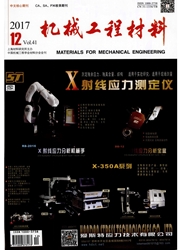

 中文摘要:
中文摘要:
通过C110钢的硫化物应力开裂试验和氢渗透试验,研究了外加电位对C110钢抗硫化物应力开裂及氢渗透行为的影响,并对其开裂机制进行了探讨。结果表明:当加载应力为C110钢屈服强度的85%、未外加电位时,C110钢通过了NACE TM 0177-2016标准A法检测,具有良好的抗硫化物应力开裂性能,而外加-100mV和+100mV电位(相对于开路电位)时,C110钢试样发生了断裂,硫化物应力开裂敏感性增强;外加阳极电位时,开裂机制与阳极溶解有关;外加阴极电位时,开裂机制与阴极析氢有关;随着外加阴极电位的增大,稳态氢渗透电流密度增大,次表面氢浓度增大,硫化物应力开裂的敏感性增强。
 英文摘要:
英文摘要:
The effects of applied potential on the sulfide stress cracking (SSC) resistance and hydrogen permeation behavior of C110 steel and the cracking mechanisms were discussed by the SSC resistance test and hydrogen permeation test. The results show that when the loading stress was 85 % of yield strength under no applied potential, C110 steel passed the test according to the NACE TM 0177-2016 standard method A indicating that C110 steel had a good SSC resistance performance. When -100 mV or + 100 mV potential (relative to open circuit potential) was applied, fracture oecured to the Cll0 steel samples and the SSC sensitivity was enhanced. When anodic potential was applied, the mechanism of cracking was related to anodic dissolution type. When cathodic potential was applied, the mechanism of cracking was related to cathodic hydrogen evolution type. With the growth of cathodic potential, the steady-state hydrogen permeation current density, the subsurface hydrogen concentration and the SSC sensitivity of C110 steel all increased.
 同期刊论文项目
同期刊论文项目
 同项目期刊论文
同项目期刊论文
 期刊信息
期刊信息
